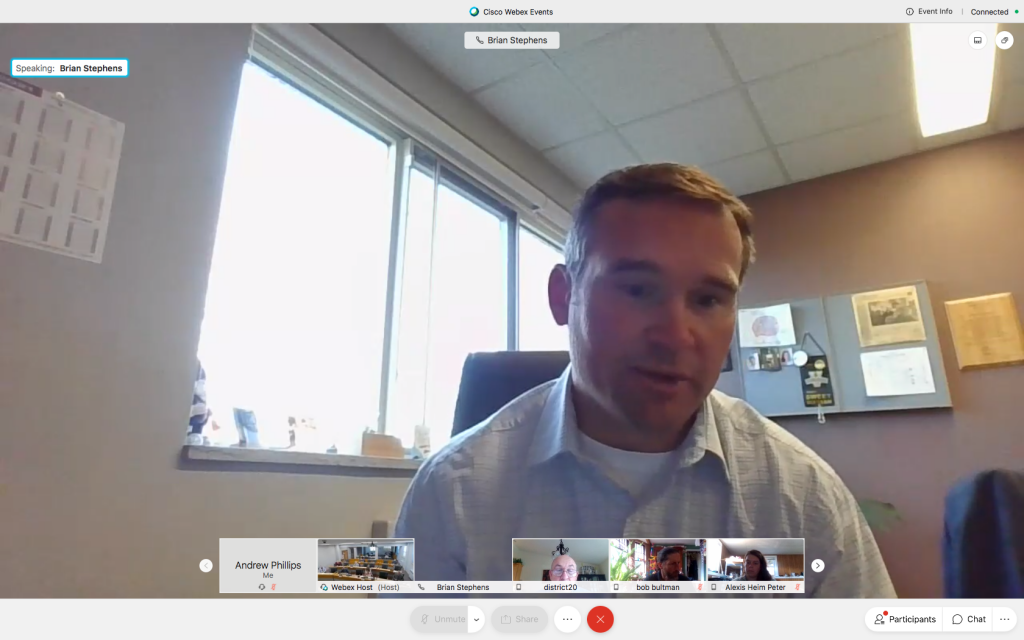
The Door County government on Friday issued a new public health advisory regarding COVID-19 preventative measures and called attention to existing enforcement options, after local and state hospital leaders this week indicated health care systems are at a crisis point.
The advisory—first issued by county Public Health officer Susan Powers and then unanimously endorsed by the county Board of Supervisors in a special meeting Friday morning—spells out in more stringent and legally formal terms the urgency of not leaving one’s house when not absolutely necessary and not gathering with people outside one’s household. It also reiterates the need for preventative measures including wearing a cloth face mask, maintaining physical distance of at least six feet, washing hands frequently and not attending any large gatherings.
The advisory does not give the county any new powers to enforce those measures, but it calls new attention to existing enforcement options the county has under a section of county code, Chapter 38, passed earlier this year. Those options include fines ranging from $100 to $500 per day that an individual or business is in violation, and—if fines do not result in compliance—seeking a court order to enforce compliance.
“This is the first time we’ve fully taken advantage of Chapter 38 of Door County code,” county corporation counsel Grant Thomas told county supervisors at the meeting Friday morning.
County leaders said they are seeking voluntary compliance with the advisory. The advisory itself is not independently enforceable, but if an individual or business does not voluntarily comply, Powers can issue a specific order to that individual or business. Non-compliance with that order opens up the other enforcement options.
The advisory, and the Board of Supervisors resolution endorsing it, contain legal language that likely would help them stand up in court if challenged, and the advisory thoroughly documents the state and local law on which it is based.
The County Board this year has been reluctant to enact any explicit county-wide mandates on COVID-19 preventative measures, citing legal concerns. At the state level, Gov. Tony Evers has issued a series of successive statewide mask mandates, with the most recent being challenged in a Republican-led lawsuit currently in the state Supreme Court. Evers said this week he would issue a new order extending the statewide mask mandate into January.
The advisory came about after Door County Medical Center president and CEO Brian Stephens sent a “position statement” to the county, Board of Supervisors chair David Lienau told supervisors at the meeting.
“We are in a situation that needs more compliance than we have seen of late,” Lienau said, adding that he also plans to issue a joint statement on COVID-19 precautions with Stephens and City of Sturgeon Bay mayor David Ward.
Speaking at the meeting, Stephens said the Medical Center has been in “a real difficult situation over the last month,” running very close to its in-patient capacity due to COVID-19.
At one point in the past week, the Medical Center had 12 patients hospitalized with COVID-19, Stephens said, the most it has ever had at one time. That meant the Medical Center was treating some of those patients outside its COVID-19 isolation unit, he said.
The Medical Center is capable of doing that safely with the use of protective equipment, Stephens said. But he emphasized that hospital capacity in general is a public safety issue.
“We just thought we needed to get the word out a little bit more,” Stephens said. “Maybe the community doesn’t realize just how dangerous this can be.”
Because Green Bay hospitals are at or near capacity, the Medical Center cannot transfer heart attack and stroke patients there like it usually would, Stephens said. This week, he said, a patient in the Medical Center’s emergency room was awaiting transfer for 12 hours before the Medical Center eventually transferred him to Froedtert Hospital in Milwaukee.
Stephens also called for greater enforcement of existing mandates and guidelines for COVID-19 prevention, including Evers’s statewide mask mandate.
Separately, the Wisconsin Hospital Association this week sent a letter to Evers and leaders of the state Legislature outlining the crisis in the state’s hospitals with respect to COVID-19 patients and deaths.
“The undeniable cause of these clear and urgent trends is the community spread of COVID, which according to many experts is worse in Wisconsin than nearly anywhere else in the country,” association president and CEO Eric Borgerding wrote in the letter. “… With few tools available right now to curb spread other than increasingly urgent public appeals, our COVID numbers are growing rapidly and predict, quite accurately so far, a health care crisis in Wisconsin that without significant, swift, and unified action will become a catastrophe.”
Door County is experiencing a spike in COVID-19 cases because people in parts of the county do not take the pandemic seriously, county supervisor Megan Lundahl said at the meeting. Lundahl, the chair of the county board’s health and human services board, said she was reflecting on recent conversations she’s had while working as a bartender.
“A lot of folks seem to be under the impression that because our numbers continue to rise and there’s been a spike that distancing and masking aren’t working,” Lundahl said. “… It may look in your circles like people are distancing and taking precautions. I can assure you that there are many pockets and areas of our community that do not take this seriously.”
Powers said she has not had to issue any fines for non-compliance with COVID-19 orders thus far, and she has issued only one order, to a public-facing business this fall. She said she and other Public Health staff try to focus on education when speaking with businesses and also refer them to guidance from the Wisconsin Economic Development Corporation.
“Often when I talk with businesses they are very motivated to hear about concerns and follow the guidelines,” Powers said. “Many of them have experienced how much trouble it can be to have cases associated with their business.”
“There is a faction of business owners that simply, I’m not sure why—if they don’t believe in the guidelines (or) just want to plow ahead—are more difficult to work with,” she added. “I’ve talked to many of them, and we do our best.”
The advisory does not outline anything new or different that businesses should be doing beyond what public health guidance already has asked of them, Powers said. She noted that Public Health asks businesses not to hold any large gatherings such as music concerts.
Powers said she has observed that people tend not to follow public health guidelines until COVID-19 affects them personally.
“They somehow feel exempt until it really hits home, and I just want to say it has hit home,” she said.
